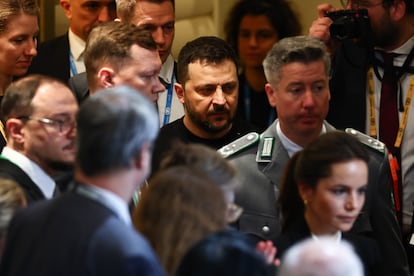Zelenskiy rails against ‘artificial deficit of weapons’ for Ukraine that gives Putin an advantage
Flows from the United States have been reduced, and this has an impact on the battlefront, says NATO chief Jens Stoltenberg at the Munich Security Conference

The president of Ukraine, Volodymyr Zelenskiy, took to the main stage of the Munich Security Conference, an annual gathering of security and foreign policy officials, on Saturday, just hours after it emerged that his country’s forces had decided to withdraw from Avdiivka, a city in the province of Donetsk practically surrounded by Russian troops since late 2023 and a symbol of Ukrainian resistance in recent months. Zelenskiy took advantage of the event in the German city to underscore the enormous damage caused on the battlefield by the shortage of military supplies from his partners.
“Dear friends, unfortunately keeping Ukraine in the artificial deficit of weapons, particularly in deficit of artillery and long-range capabilities, allows Putin to adapt to the current intensity of the war,” Zelenskiy said.
Regarding the withdrawal from Avdiivka decided by the new military command, Zelenskiy defended the measure, alleging the need to preserve the lives of the soldiers in the face of the enemy’s firepower and their greater willingness to accept casualties. “We need more weapons, we don’t have enough. But the most important asset is the soldiers, their lives. We must protect them,” he said. The president said he could not provide exact figures, but that the casualty balance is seven Russians for every Ukrainian. “Russia has a total disregard for the lives of its soldiers,” he said.
The causes of the disturbing dynamics of war are clear. Flows from the United States have been reduced, and this has an impact on the battlefront, added Jens Stoltenberg, NATO Secretary General.
The paralysis of aid for Ukraine in the U.S. Congress is one of the key elements of debate in Munich. Republican Senator Pete Ricketts defended his party’s obstructionism, arguing that each country has its priorities and crises, that the United States faces one of its own with the arrival of irregular migrants at the southern border, and that the rest of the world should understand that they are trying to to advance their political goals on this matter while maintaining aid to Ukraine as a negotiating tool.
After these arguments, the Prime Minister of Estonia, Kaja Kallas, intervened, emphasizing that the time that is wasted works in favor of Putin and against a world based on rules.
German Chancellor Olaf Scholz also spoke out on these issues, reaffirming his government’s commitment to increasing military spending and maintaining support for Ukraine over time. Berlin and Paris sealed agreements with Kyiv on security guarantees. “We have to ask ourselves if we are doing enough to signal [to Putin] that we are in this for the long term,” Scholz said. Later, he answered himself: “We Europeans have to do more.”
Speaking along these lines, the president of the European Commission, Ursula von der Leyen, announced the presentation, within three weeks, of a defense industrial strategy.
“Don’t ask us Ukrainians when the war will end. Ask yourselves why Putin is still in a position to wage it,” added Zelenskiy, demanding greater efforts from the partners while thanking them for everything that has been done to date.
Sign up for our weekly newsletter to get more English-language news coverage from EL PAÍS USA Edition
Tu suscripción se está usando en otro dispositivo
¿Quieres añadir otro usuario a tu suscripción?
Si continúas leyendo en este dispositivo, no se podrá leer en el otro.
FlechaTu suscripción se está usando en otro dispositivo y solo puedes acceder a EL PAÍS desde un dispositivo a la vez.
Si quieres compartir tu cuenta, cambia tu suscripción a la modalidad Premium, así podrás añadir otro usuario. Cada uno accederá con su propia cuenta de email, lo que os permitirá personalizar vuestra experiencia en EL PAÍS.
¿Tienes una suscripción de empresa? Accede aquí para contratar más cuentas.
En el caso de no saber quién está usando tu cuenta, te recomendamos cambiar tu contraseña aquí.
Si decides continuar compartiendo tu cuenta, este mensaje se mostrará en tu dispositivo y en el de la otra persona que está usando tu cuenta de forma indefinida, afectando a tu experiencia de lectura. Puedes consultar aquí los términos y condiciones de la suscripción digital.









































